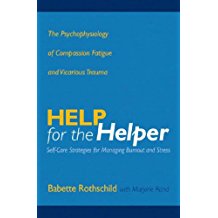 The Psychophysiology of Compassion Fatigue and Vicarious Trauma – Self Care Strategies for Managing Burnout and Stress
The Psychophysiology of Compassion Fatigue and Vicarious Trauma – Self Care Strategies for Managing Burnout and Stress
I suspect those in the the caring professions could be divided into two categories; those who’ve experienced burnout, and those who will experience it – in other words, it’s beyond an occupational hazard, it’s perhaps an occupational reality at some stage or another. I know there are may times when I’ve stepped into the shoes of yoga teacher and not felt fully present at the outset.
Although ostensibly aimed at councillors and psychotherapists, almost certainly as that’s the authors background, this is a book for anyone in a caring profession, including, not exclusively, yoga teachers. It’s about recognising signs of blurred boundaries and burnout, and tackling them.
It’s not a simple book – a lot of reference is made to theories of therapeutic engagement, including Counter-transference and Projective Identification, and at times the depth of this discourse feels perhaps unnecessary, however it sets the context for exploring the issues and solutions in greater depth. There is a good clear section on brain anatomy, helping to understand why we respond and think as we do. The text is broken up by numerous case studies and practical interludes.
Anyone looking for simple formulaic answers will be disappointed; for me this was a book about challenging thoughts and patterns, almost as much about raising awareness as much as providing solutions. It was however a useful primer, and I suspect a book I’ll return to – the challenge will be returning to it at the time it’s most needed.
This isn’t a book for the casual reader. It’s one for the professional, and a book that’s best read and absorbed before it’s needed, rather than as psychotherapeutic “first aid” – none the less it’s a book I would recommend to colleagues.
Buy from Amazon using this link, and Yinspire earns a small commission
https://amzn.to/2HNaUTO
